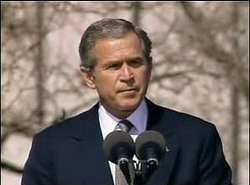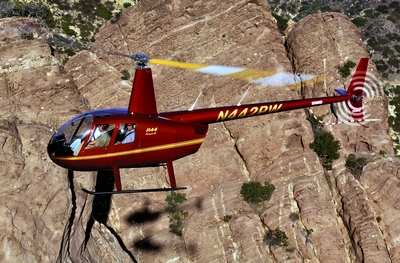Weak Dollar Has Been Boon For Nation's Largest Helomaker
 White House staffers chose an
appropriate location for President Bush to hawk the benefits of
foreign trade Wednesday -- Robinson Helicopters, which sells 70
percent of its production overseas.
White House staffers chose an
appropriate location for President Bush to hawk the benefits of
foreign trade Wednesday -- Robinson Helicopters, which sells 70
percent of its production overseas.
"Free trade means good-paying jobs for Americans," Bush told the
crowd assembled at the helomaker's Torrance, CA headquarters,
reports The Los Angeles Times. The stop was the first on a
three-day jaunt, in which the President aims to promote the agenda
he presented in Monday's State of the Union address -- the last of
Bush's presidency.
In his speech, Bush promoted three trade pacts currently stalled
in Congress -- agreements with Panama, South Korea, and Colombia.
He concentrated on the benefits of the Colombian agreement in
particular -- noting not only would such a deal mean a new market
for American products (and, hopefully, more jobs) but it would also
support an ally fighting against drug crime, and corruption.
The proposed Colombian pact would also eliminate that nation's
current tariffs on helicopters -- which now reach as high as 10
percent -- and a five percent duty charge on helicopter parts. The
Panamanian deal would erase a 15% tariff on new helicopters. "It
matters to our economy, and it matters to the jobs right here,"
Bush said of his desire to reduce tariffs.
One area neither Bush, nor California Governor Arnold
Schwarzenegger, chose to promote during the event, however, is
something Robinson unabashedly takes full advantage of -- the
current devaluation of the US dollar against other foreign
currencies.

In theory, a lower dollar contributes to deficits, and other
economic pitfalls, while also making it more expensive for US
consumers to buy foreign goods. It's been a boon for Robinson,
though, which sells more helicopters annually than its two arguably
better-known competitors, Sikorsky and Bell, do combined. The weak
dollar means it's cheaper for foreign parties to buy Robinsons.
"We love to see the dollar get as low as possible," company
founder Frank Robinson said last year.
"You can't tell the people at Robinson Helicopter that trade
isn't good," Bush said Wednesday. "When 70% of that which you
manufacture gets sold somewhere else other than the United States,
they ought to have a sign walking in here and say, 'Trade is not
only good, it is great; and we want the federal government to make
it easier for us to sell products.'"
Critics of the proposed trade agreements -- most of them
Congressional Democrats -- say all three deals present issues the
Bush administration would prefer to gloss over. The Colombian
agreement ignores a relative lack of progress the country has done
to eliminate violence, much of it drug related, within its borders;
Panama's trade deal is being held up due to the fact the country's
legislature elected as its head Pedro Miguel Gonzalez -- who, ah,
is wanted in the US on murder charges.
As for South Korea, opponents say the agreement wouldn't do
enough to open that market up for US beef and automobiles. All
three deals would also put American jobs at risk, critics say, as
more jobs could leave this country, and go where labor is cheaper,
and much less regulated.

Bush downplayed critics' remarks in his speech, noting "[i]t is
in our strategic interests that we support democracies in our
neighborhood. And it's in our strategic interest and our economic
interest that the United States Congress passes this free trade
agreement with Colombia."
 NTSB Final Report: Cozy Cub
NTSB Final Report: Cozy Cub ANN FAQ: Contributing To Aero-TV
ANN FAQ: Contributing To Aero-TV Classic Aero-TV: Seated On The Edge Of Forever -- A PPC's Bird's Eye View
Classic Aero-TV: Seated On The Edge Of Forever -- A PPC's Bird's Eye View ANN's Daily Aero-Linx (04.29.25)
ANN's Daily Aero-Linx (04.29.25) ANN's Daily Aero-Term (04.29.25): Execute Missed Approach
ANN's Daily Aero-Term (04.29.25): Execute Missed Approach





